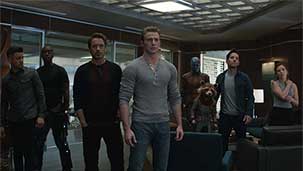Seven years ago, after seeing The Avengers, I questioned our ability to compose a fair review of a movie that seemed “from start to finish, in tone and content, in the quiet beats between loud explosions and the loud beatings between quiet expositions, plucked directly from [my] twelve year-old brain.”
Much has happened in those seven years. And I’m not talking about fatherhood, or politics, or climate change, or even these extra ten pounds we’re carrying around (spoiler: it’s not muscle). I’m talking about how movies themselves have changed—the way they’re made, the way we watch them, and what they mean, generally, in the cultural landscape. All this change is embodied in Avengers: Endgame.
No casual filmgoer could walk into this film and have the first clue about what it all means. To comprehend what is going on in the first five minutes is dependent on an intimate knowledge not just of the previous instalment, Avengers: Infinity War, but of the entire 21-film Marvel Cinematic Universe. But here, in 2019, the “casual moviegoer” is an extinct species. The general public has been converted. They’ve become nerds, like us. They may not possess our encyclopedic knowledge of the Marvel canon, they may not recognize the clever references to the final pages of Jim Starlin’s Infinity Gauntlet mini-series, but they have become emotionally invested in these characters, intellectually invested in the de-tangling of the plot, and, after countless 20-dollar tickets, financially invested in seeing how this all plays out (see: the sunk-cost fallacy).
In this sense, Avengers: Endgame is more than just a movie. It’s an event. In the streaming era, just a year after Netflix was nominated for 15 Oscars (yes, that Netflix, the DVD delivery-service that just started showing old Tom Selleck movies on your X-Box 360), what else would you call these gigantic pieces of entertainment that sell out tickets months in advance, draw massive crowds to the multiplex where they cheer along with the action like sports fans, incite passionate (and maddening) debate in comments sections and mainstream press outlets alike? This new Avengers movie, the fourth, has become a triumphal event in the popular consciousness the same way we the original Avengers film was triumphal for us. Everyone, these days, is 12-year-old Jared Young.
To some degree, this all makes Avengers: Endgame somewhat critic proof. There has never been a franchise like this on the big screen. Likewise, the criteria with which to assess it as a good or bad film has never previously existed. Objective and subjective measures no longer apply. We have entered a world of inter-subjectivity: we possess, culturally – globally, even – shared desires about what we want from the film and a shared expectation about how it should be delivered. We’re all true believers. So maybe the only way to judge whether Avengers: Endgame is successful is on the spectrum of gratuitousness to gratification.
Which moments felt superfluous to the three-hour narrative, and which brought meaningful closure to the threads that have been woven through the series since the beginning? Which scenes felt designed only to satisfy the blockbuster genre’s demands for eye-scathing spectacle, and which were built to propel the plot forward (not just of the plot of this film, but the uber-plot of all the films)? I am happy to report that Avengers: Endgame features more of the latter than the former. It is an incredibly well-engineered machine. In the very same way that comic books, with their circular self-references and asterisked editor’s notes at the bottom of panels, revel in their own wonderful (and sometimes perplexing) intricacy, the Marvel Cinematic Universe has built itself broad enough that the films can now indulge in that same ouroboros-like narrative tail-swallowing. And Avengers: Endgame does this really well. Sometimes for laughs. Sometimes for tears. Almost always effectively. It doesn’t just expect you to have seen all the previous films—it rewards you for having seen them.
The idea of multiple comic book heroes occupying the same screen – and, therefore, the same diegetic world – was, when The Avengers first came out, a thrilling prospect. And now? It’s a thrill to have so many of the characters stripped away so that the original six can sit quietly and contemplate the inevitability of change, the inescapability of death, and what it means to live.
And there is a lot of quiet contemplation. Perhaps what’s most surprising about Avengers: Endgame is just how little action there is. The first act is a dystopian drama, the second act is a heist film, and the third, though it erupts into a computer-generated cacophony, handles that cacophony well, giving us space to breathe between the explosions and dog-piles and mass-dismemberments.
We’re almost forty, Jared.. Our knees ache. We forget things. It takes an absurdly long time to pee. And when we think we’re done peeing—we’re not. There’s more. There's always more. We’ve gotten old, and it’s impossible to pretend like we haven’t. These Marvel movies have matured, too. But instead of getting tired, breaking down, limping through their injuries, they’ve gotten stronger. And they haven’t done it by trying to be something they aren’t; these aren’t movies based on comic books, they’re comic book movies, and that distinction – that self-recognition (both in front and behind the camera) – makes all the difference.
Time for a little self-recognition on our part, too. Time for us to realize that it’s okay to enjoy a movie like this on our own terms. We don’t have to imagine that we’re 12-years-old in order to connect with the euphoria of a well-told superhero story. Even at the age of forty, even without the filter of nostalgia, there are lessons to learn and pleasures to be had. As the years go by, enchantments like this are fewer and farther between—so let’s not be embarrassed to love them.
Sincerely,

Jared







